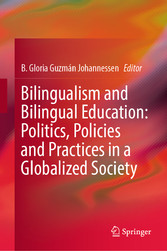Suchen und Finden
Service

Bilingualism and Bilingual Education: Politics, Policies and Practices in a Globalized Society
B. Gloria Guzmán Johannessen
Verlag Springer-Verlag, 2019
ISBN 9783030054960 , 290 Seiten
Format PDF, OL
Kopierschutz Wasserzeichen
Geräte
Mehr zum Inhalt

Bilingualism and Bilingual Education: Politics, Policies and Practices in a Globalized Society
This volume presents a multinational perspective on the juxtaposition of language and politics. Bringing together an international group of authors, it offers theoretical and historical constructs on bilingualism and bilingual education. It highlights the sociocultural complexities of bilingualism in societies where indigenous and other languages coexist with colonial dominant and other prestigious immigrant languages. It underlines the linguistic diaspora and expansion of English as the world's lingua franca and their impact on indigenous and other minority languages. Finally, it features models of language teaching and teacher education.
This book challenges the existent global conditions of non-dominant languages and furthers the discourse on language politics and policies. It does so by pointing out the need to change the bilingual/multilingual educational paradigm across nations and all levels of educational systems.
Dr. B. Gloria Guzman Johannessen is Professor Emeritus from California State University Pomona and retired professor from Texas State University. Her academic background and professional work are on applied linguistics and sociolinguistics. The span of her professional career includes teaching and research in literacy, intercultural bilingual education, program administration, testing, evaluation, social justice, and faculty mentoring. Her academic and research focus was influenced by her work with language minority students in USA and Latin America, and especially with Indigenous and Creole-English populations. These experiences added relevance to her teaching and research by furthering her vision that critical language, critical pedagogy, and critical literacy are the foundation for equitable education and social justice.
Shop

